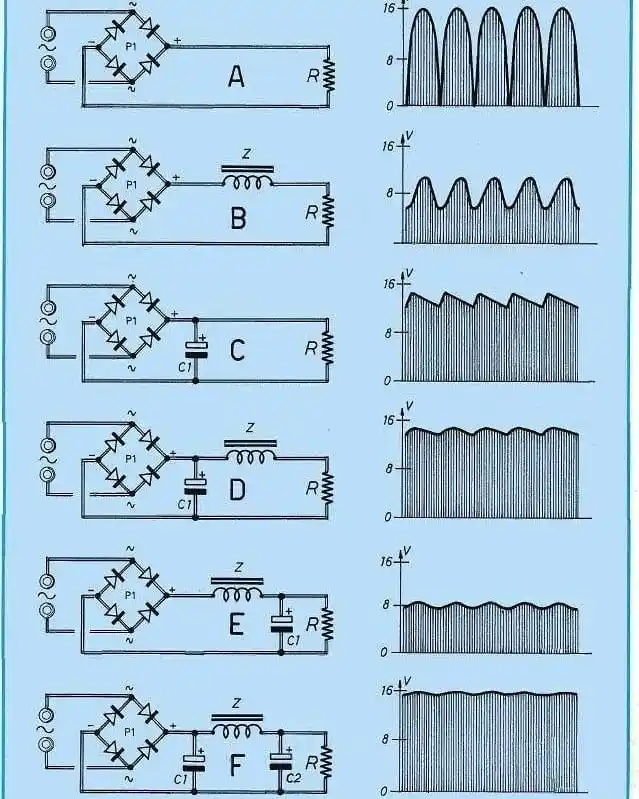
electronicsworld2020
668 subscribers
About electronicsworld2020
https://www.instagram.com/electronicsworld2020 Welcome to Electronics World! ⚡ Discover a world of electronics with us: 📚 Study Resources 🌟 Latest Trends 🔗 Articles & Ebooks 📩 Free Newsletter 🧠 Basic Concepts Check out our website at engineersschool.in to learn more! ⚡🌐
Similar Channels
Swipe to see more
Posts

✅ Pure AC to DC Full Bridge Rectifier! Let’s explore six setups (A to F) of a circuit converting AC to DC with a bridge rectifier (P1). Each setup adds filtering components to smooth the DC output, improving the waveform step by step. A: No Filter Setup: Bridge rectifier (P1) and resistor (R) as load. Waveform: Very rough, sharp peaks reaching 16V and dropping to 0V. B: Adding Inductor Adds inductor (Z) in series with R. Waveform: Smoother, reducing peaks and dips but still fluctuates between 8V and 16V. C: Using Capacitor Replaces inductor with capacitor (C1) in parallel with R. Waveform: Much smoother. Capacitor stores and releases energy, reducing ripples to around 8V. D: Inductor + Capacitor Combines inductor (Z) in series and capacitor (C1) in parallel with R. Waveform: Smoother than C, less fluctuation, voltage more stable. E: Pi-Filter Adds second capacitor (R1) after inductor, forming “pi” with C1, Z, and R1. Waveform: Almost flat, around 12V with minimal variation. F: Double Pi-Filter Adds third capacitor (C2) after pi-filter. Waveform: Smoothest, nearly perfect line at 12V with almost no ripples. Key Comparison A: Very rough output. B: Smoother but still fluctuating. C: Significant improvement. D: Combines filter elements for better smoothing. E: Almost flat with pi-filter. F: Nearly perfect DC output. SAVE this post! ✅ & Share with your friends!

Your friendly reminder: social media thrives on negativity. Not because of algorithms, but because of human nature. People enjoy watching things rise, and they enjoy tearing them down even more. So when you launch something, don’t be ashamed. Don’t let the noise get to you. Most of it doesn’t matter. What does matter is learning to spot what’s valuable. Real feedback. Honest criticism. Take that in. Use it. And keep going. Share with your loved ones! ❤


Q. The function of an inductor in a filter circuit is to

https://www.linkedin.com/pulse/industrial-robots-types-applications-future-trends-engineersschooll-gc53c 🔗 *Click on the above link to READ the full article!*

https://www.linkedin.com/pulse/industrial-communication-protocols-connecting-machines-eakyf?utm_source=share&utm_medium=member_android&utm_campaign=share_via 🔗 *READ the full article!*















